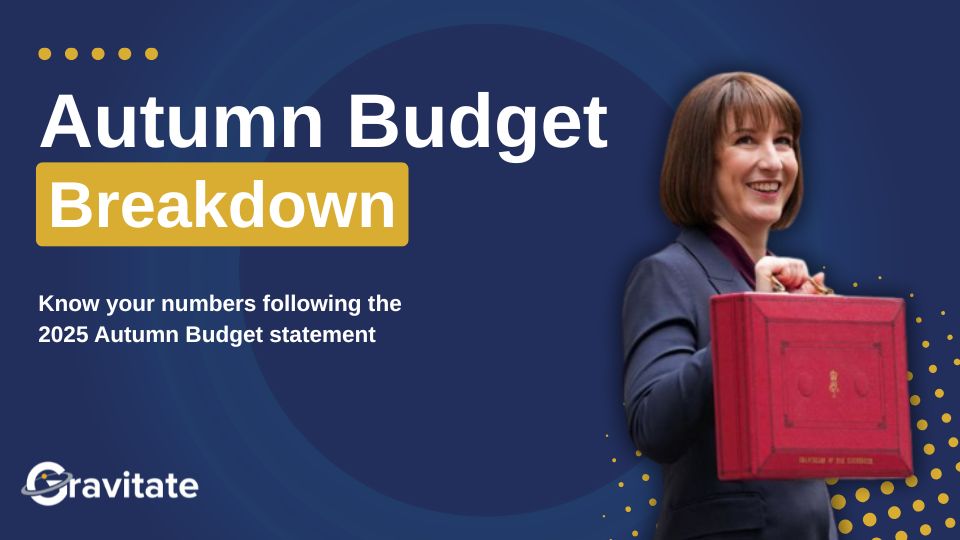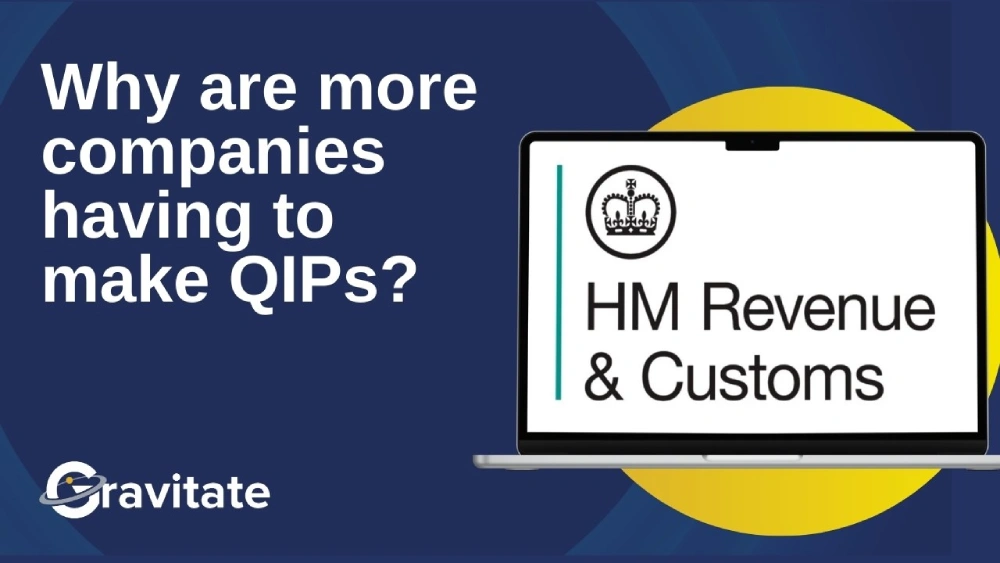The much anticipated Autumn Budget statement of 2025 has been delivered, and there is a lot to talk about!
At Gravitate, we are committed to educating the people we meet to empower better decision making, that includes personal, corporate and employment taxes. Here is our complete breakdown of the announcements.
Last year, in her maiden Budget, the chancellor sought to balance the public finances with tax rises to cover a reported £22 billion black hole.
This year, Reeves arguably faced an even more difficult landscape. In turn, she has announced an estimated £26 billion of tax rises by 2029/30.
Prefer video? Watch our full Autumn Budget debrief webinar
Tax & NI Thresholds freeze extended to 2031. Student Loan plan 2 threshold frozen until 2030
The Labour manifesto promised not to increase Income Tax or National Insurance (NI), and despite pre-Budget speculation, the government has kept to that promise in this Budget.
However, the chancellor did announce that the Income Tax thresholds will remain frozen for a further three years beyond the previous 2028 freeze, staying where they are until April 2031. This move will raise £8 billion for the government. Similarly, the Inheritance Tax (IHT) threshold freeze is extended from 2030 to 2031.
While this will not increase your Income Tax or IHT bills directly, this fiscal drag means more of your income and wealth may be exposed to tax over time.
The government is also upholding its commitment to bringing pension pots into the scope of IHT from April 2027, and reforms to relief for business and agricultural assets from April 2026.
The student loan repayment threshold will also be maintained for three years.
A range of significant changes for business owners
In addition to the Dividend Tax increase, the chancellor announced a range of changes that could affect business owners, including:
A new tax on electric vehicles
The Electric Vehicle Excise Duty (eVED) will come into effect in 2028 and equal 3p per mile for battery electric cars and 1.5p per mile for plug-in hybrids. The rate per mile will increase annually in line with the CPI.
Increases to both the National Living Wage (NLW) and National Minimum Wage (NMW)
From 1 April 2026, the NLW paid to workers aged 21 and over will rise by 4.1%, from £12.21 to £12.71 an hour, increasing annual income by approximately £900 a year for full-time employees. For those aged 18 to 20, the NMW will rise by 8.5% from £10 to £10.85 an hour, equivalent to around £1,500 a year if working full-time. For 16- and 17-year-olds, and those on apprenticeships, the NMW will rise by 6%, going from £7.55 to £8 an hour.
Listing Relief from Stamp Duty Reserve Tax for some businesses
The chancellor said this will “make it easier for entrepreneurs to start, scale, and stay in the UK”.
Reduced Capital Gains Tax (CGT) relief for Employee Ownership Trusts (EOTs)
When a business is sold to an EOT, CGT relief will fall from 100% to 50% starting from November 2025. This will raise £0.9 billion from 2027/28 onwards.
Fully funded apprenticeships for under-25s
This will make them effectively free for small- and medium-sized businesses (SMEs) from April 2026.
Lower business rates for more than 750,000 retail, hospitality, and leisure properties
That move will be funded through higher rates on properties worth £500,000 or more, such as warehouses used by online retail.
Customs duty will apply to parcels of any value from March 2029 at the latest
There is an existing exemption for parcels worth less than £135, favouring large-scale importers.
Capital allowances: First year 100% allowances for zero emission vehicles (ZEVs) and charge points
100% First Year Allowance (FYA) is available on qualifying expenditure on zero emission cars and for qualifying expenditure on plant or machinery for electric vehicle (EV) chargepoints. This is being extended to 31 March 2027 for corporation tax purposes, and 5 April 2027 for income tax purposes.
Inheritance Tax: Unused allowance for agricultural and business property reliefs
From 6 April 2026, any unused £1 million allowance for the 100% rate of agricultural property relief (APR) and business property relief (BPR) will be transferable between spouses and civil partners, including if the first death was before 6 April 2026.
Venture Capital Trust (VCT)
Income tax relief on qualifying VCT investments currently stands at 30% and this will be reduced to 20% from 6 April 2026.
Enterprise Management Incentive (EMI) Scheme – Company Eligibility expansion
The government will increase the employee limit to 500, the gross assets test to £120 million, the company share option limit to £6 million from April 2026 and the maximum holding period will increase to 15 years including in respect of existing EMI contracts. The EMI notification requirement will also be removed from April 2027.
The tax rates on dividends, savings, and property income will rise by 2%
Tax rates are set to rise for dividends, savings, and property income.
- Dividends: From April 2026, ordinary and upper rates of tax on dividend income will rise by two percentage points to 10.75% and 35.75% respectively. There is no change to the additional rate, which will remain at 39.35%.
- Property and savings: From April 2027, the rate of tax on property and savings income will increase by two percentage points across all tax bands to 22%, 42%, and 47% respectively.
The government confirmed that, even after these reforms, 90% of taxpayers will still pay no tax on their savings. However, these changes are set to impact business owners and landlords.
The chancellor says these increases will raise £2.2 billion in 2029/30.
The ISA allowance will be reformed for under-65s, and some allowances have been frozen
The chancellor announced that from April 2027, the Individual Savings Account (ISA) allowance will change for under-65s.
As it stands, adults can contribute £20,000 across their ISAs, including Cash ISAs and Stocks and Shares ISAs, each tax year.
From April 2027, £8,000 of this allowance will be reserved exclusively for investments, leaving an available £12,000 that savers can pay into their non-investment accounts, such as Cash ISAs.
Savers over the age of 65 will continue to be able to save up to £20,000 in a Cash ISA each year.
The allowances for Junior ISAs and Lifetime ISAs are frozen until April 2031 at £9,000 and £4,000 a year, respectively.
Salary sacrifice on pension contributions to be capped at £2,000
The chancellor put a cap on NI-efficient pension contributions made under salary sacrifice.
Salary sacrifice schemes cost the government £2.8 billion in 2016/17, but this figure was set to triple to £8 billion by 2030/31.
The government will charge employer and employee National Insurance contributions (NICs) on pension contributions above £2,000 a year made via salary sacrifice. This will take effect from 6 April 2029.
The chancellor says that many of those on low and middle incomes will be able to continue using salary sacrifice as normal, while high earners can expect to pay increased NI.
New “mansion tax” on high-value properties
The chancellor announced the much-speculated “mansion tax” that will affect the top 1% of properties.
The new property surcharge will be paid alongside Council Tax.
There will be four price bands starting with £2,500 for a property valued between £2 million and £2.5 million. For properties valued more than £5 million, the levy will be £7,500.
The measure is estimated to raise £400 million by 2031.
Welfare reforms expected to increase by 2029/30
The BBC reported that changes to the government’s previously announced winter fuel payments and health-related benefits will cost £7 billion in 2029/30.
In addition, Reeves revealed she would remove the two-child benefit cap. This will cost £3 billion by 2029/30.
State Pension: Removal of overseas access to Class 2 National Insurance contributions and committing to the triple lock
As a result of a loophole in the Class 2 voluntary NICs regime, overseas individuals with a limited connection to the UK can build a State Pension entitlement through cheaper rates.
The government is looking to end this by removing access to the cheapest Class 2 NICs for these individuals. Additionally, it will increase the initial residency or contribution requirements for those living outside the UK.
The chancellor also confirmed the government’s commitment to the triple lock. From April 2026, this will increase the basic and new State Pension by 4.8%, offering up to an additional £575 per year to pensioners, depending on their entitlement.
Other announcements that may affect you
- Household energy bills will fall. Reeves is scrapping the Energy Company Obligation (ECO) scheme, saying that on average, families will save £150 a year in 2026.
- Fuel duty will be frozen until September 2026. In addition, a new “fuel finder” will help drivers find the cheapest fuel, saving the average household £40 a year.
- Reducing the levy threshold on soft drinks. From 1 January 2028, the sugar tax will also be applied to milk-based drinks, including bottled milkshakes and lattes.
- A spousal exemption for agricultural and business asset IHT relief. Unused combined business and agricultural asset IHT relief will become transferable between spouses and civil partners.
- Tobacco Duty and Alcohol Duty will both be uprated. Tobacco Duty will be uprated as announced last year, and Alcohol Duty will now rise with inflation.
- Rising taxes on online gambling. From April 2026, Remote Gaming Duty will increase by 21% to 40%. A new Remote Betting Rate set at 25% will be introduced from April 2027, though horse race betting will be exempt from the changes.
Other key thresholds that remain the same
More broadly, the chancellor made no mention of other key thresholds that will remain the same. These include:
- The pension Annual Allowance
- Stamp Duty Land Tax for residential properties
- The headline rates of Income Tax, NI, and VAT, as outlined in the government’s election manifesto.
Please note
All information is from the Budget documents on this page.
The content of this Autumn Budget summary is intended for general information purposes only. The content should not be relied upon in its entirety and shall not be deemed to be or constitute advice.
While we believe this interpretation to be correct, it cannot be guaranteed, and we cannot accept any responsibility for any action taken or refrained from being taken as a result of the information contained within this summary. Please obtain professional advice before entering into or altering any new arrangement.
If you are concerned or require advice relating to any aspect of today's budget announcements, please send us a message.

.png)


.png)

.png)
.png)

.png)
.png)
.png)













.png)
.png)
.png)

.png)
.png)

.png)








.webp)
.webp)








.jpg)

.webp)
.png)

.svg)
